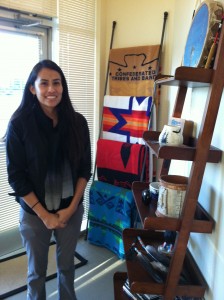Seattle Business Magazine has honored Galanda Broadman, PLLC, in its listing of "the Puget Sound Region's Best Lawyers for 2013," in both the arenas of Gaming Law and Native American Law. The firm was selected as some of the "best lawyers in the business" in the State of Washington by Galanda Broadman's peers, and is the only American Indian-owned law firm to receive these honors. This honor follows several other recent honors for Galanda Broadman and its lawyers. In November 2012, Galanda Broadman received a prestigious Tier 1 ranking in the 2013 Edition of U.S. News - Best Lawyers “Best Law Firms,” in the arena of Native American Law. In addition, firm co-founder Gabe Galanda was then named to The Best Lawyers in America in the practice areas of both Gaming Law and Native American Law, for the seventh straight year. Gabe was named a "Difference Maker" by the American Bar Association in November as well. Also, last month Lawyers of Color listed the firm in its Big Book of the Best Boutiques, an exclusive list of the top minority law firms in each state.
"This honor gives us great pride. We work our very hardest for our tribal clients and to receive recognition from them and from our peers feels awesome," said Gabe in a recent Indian Country Today interview.
"We are privileged to be entrusted to represent tribal governments and Indian people, frequently during very critical times. It is the opportunities that our tribal clients have given us, and the results we have been able to obtain for them, and the underlying teamwork with our clients and each other that resulted in this honor. We feel as grateful to our tribal clients for those opportunities as we feel honored by this accolade."
Galanda Broadman, PLLC, “An Indian Country Law Firm,” is dedicated to advancing tribal legal rights and Indian business interests. The firm, which is headquartered in Seattle, Washington and also has offices in Bend, Oregon, represents tribal governments, businesses and members in critical litigation, business and regulatory matters, especially in matters of Indian Treaty rights, tribal sovereignty and taxation.
Gabe is an enrolled member of the Round Valley Indian Tribes of California. He currently sits on the National Native American Bar Association (NNABA) Board of Directors, chairing the group’s “Include Indian Law on State Bar Exams” Initiative, and co-chairing its “Increase Natives and Tribal Court Judges in the Judiciary” Initiative. Gabe is a past President of the Northwest Indian Bar Association and past Chair of the Washington State Bar Association (WSBA) Indian Law Section.
Anthony is the immediate past Chair of the WSBA Administrative Law Section, and author of “Administrative Law in Washington Indian Country.” In September 2012, Anthony was specially honored for his outstanding service as Chair of the Administrative Law Section. He is a former Trustee of the WSBA Indian Law Section, and also serves as Editor-in-Chief of the Section’s Indian Law Newsletter. Anthony has been named a Rising Star by Washington Law & Politics-Super Lawyers magazine.
Ryan Dreveskracht is a firm associate. Prior to joining Galanda Broadman he was a law clerk to the Honorable Kathleen Kay, in the U.S. District Court for the Western District of Louisiana. Ryan has published ten journal and law review articles in 2011-12 alone, on issues like tribal renewable energy, and has served as the Managing Editor for the National Lawyer’s Guild Review since 2010.


 The second section addresses Native American economic development, generally, focusing on practical sovereignty, capable institutions, and cultural match. The third section discusses solar energy projects: the benefits of solar energy when compared to other types of energy production; the ways that these projects will benefit Indian country specifically; and the rationale behind implementing solar energy projects as a means to sustainable economic development in Indian country. The fourth section will briefly discuss the question: Given the advantages of solar energy that the article advocates, why is the uptake in Indian country not already prolific?
The second section addresses Native American economic development, generally, focusing on practical sovereignty, capable institutions, and cultural match. The third section discusses solar energy projects: the benefits of solar energy when compared to other types of energy production; the ways that these projects will benefit Indian country specifically; and the rationale behind implementing solar energy projects as a means to sustainable economic development in Indian country. The fourth section will briefly discuss the question: Given the advantages of solar energy that the article advocates, why is the uptake in Indian country not already prolific? A few excerpts:
A few excerpts: Chrystal previously worked as a Indian Child Welfare Case Manager for the Tulalip Tribes; a Gang Intervention Counselor for the Muckleshoot Indian Tribe; a Corrections Officer for the Washington State Department Corrections at the McNeil Island Correction Center; a Case Management Assistant at Seattle Municipal Court; and an intern at the Yakama Nation Prosecutor’s Office. She will be applying to law school this fall.
Chrystal previously worked as a Indian Child Welfare Case Manager for the Tulalip Tribes; a Gang Intervention Counselor for the Muckleshoot Indian Tribe; a Corrections Officer for the Washington State Department Corrections at the McNeil Island Correction Center; a Case Management Assistant at Seattle Municipal Court; and an intern at the Yakama Nation Prosecutor’s Office. She will be applying to law school this fall.
 This honor follows several other recent honors for Galanda Broadman and its lawyers. Last month, Galanda Broadman recently received a prestigious Tier 1 ranking in the 2013 Edition of U.S. News - Best Lawyers “Best Law Firms,” in the arena of Native American Law. In addition, firm co-founder Gabe Galanda was named to The Best Lawyers in America in the practice areas of both Gaming Law and Native American Law, for the seventh straight year. Gabe was also recently named a "Difference Maker" by the American Bar Association.
This honor follows several other recent honors for Galanda Broadman and its lawyers. Last month, Galanda Broadman recently received a prestigious Tier 1 ranking in the 2013 Edition of U.S. News - Best Lawyers “Best Law Firms,” in the arena of Native American Law. In addition, firm co-founder Gabe Galanda was named to The Best Lawyers in America in the practice areas of both Gaming Law and Native American Law, for the seventh straight year. Gabe was also recently named a "Difference Maker" by the American Bar Association.



